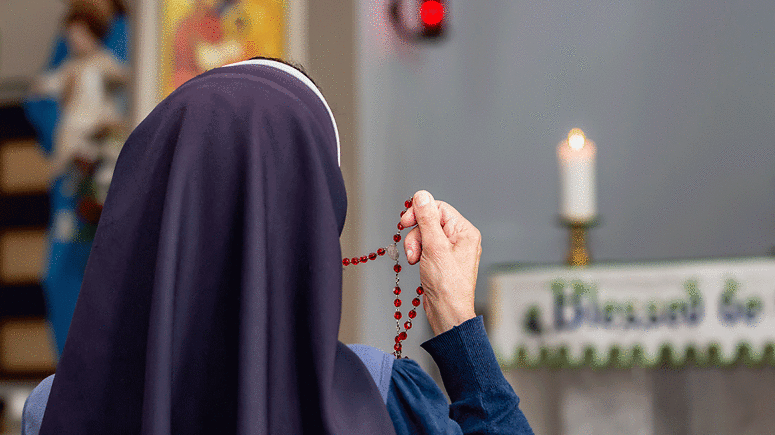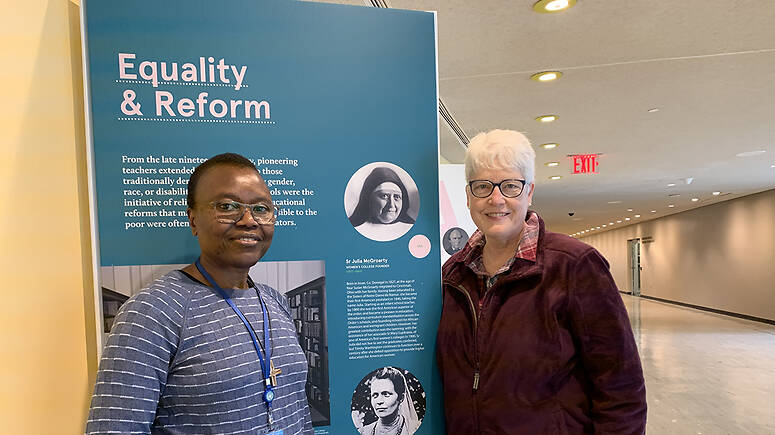
Pierless Bridges
The Joan and Ralph Lane Center for Catholic Social Thought and the Ignatian Tradition
Catholic Sisters and Nuns and Solidarity
At the beginning of the spring semester of 2020, while holding the Lo Schiavo Chair at the Joan and Ralph Lane Center for Catholic Social Thought and the Ignatian Tradition at the University of San Francisco (USF), I called to mind a meeting of the Society for the Scientific Study of Religion in the late 1980s in which, as graduate students in sociology, we were introduced to Ralph Lane Jr., then professor of sociology at the University of San Francisco. He spoke to us of his commitment to the sociology of religion and his work on behalf of social justice. Since coming to the Lane Center, I have learned more about the enduring legacy of Ralph and his wife, Joan.
Ralph Lane spent 30 years at the University of San Francisco as professor and chair of the Sociology Department. He had received his bachelor’s and master’s degrees from Columbia University and his doctorate from Fordham University. Ralph died in 2007, at the age of 84. His path to USF included a couple of challenging turns. He served for three years in the infantry in Europe and the Pacific during World War II. He also served for three years as a foreign service officer, working as a cultural attaché to the U.S. embassy in Kabul, Afghanistan. In Kabul, he met Joan Solari. They married, settled in San Francisco, and together raised a daughter and son.
After retirement from USF, Ralph continued his pursuit of fulfilling works and ministries. He commenced writing poetry and ultimately published two volumes. In addition to his creative work, he also undertook pastoral work through his parish. It is clear that Ralph’s Catholic faith was engaged and engaging. While his scholarly life included teaching, writing, and community engagement, he was also involved in the founding of centers at USF that endure. In addition to the Lane Center, which Ralph founded with his wife, Joan, he helped to found the Leo T. McCarthy Center for Public Service and the Common Good. The prin ciples of Catholic social thought are evident in all of his life’s work. This same commitment to the principles of Catholic social thought, also using the tools of sociology, undergirds my work at the Lane Center in spring 2020.
As part of my appointment, I am continuing my research in the sociology of religion, particularly on religious life for women within global Catholicism.
There are more than 700,000 Catholic sisters in the world, located in almost every country of the world, forming what is now known as a 'Global Sisterhood.' Women religious work on behalf of social justice, from the center of society, as in the many women religious who work in their congregational NGOS at the United Nations, to the many who work on the margins of society — in prisons, in homeless shelters, and on the southern border of the United States.
At the same time, many religious orders have made and continue to make corporate commitments to a myriad of educational, health care, advocacy, parish and social service institutions.
My colleagues and I have conducted national studies in this country over the last several years that have given voice to two cohorts within religious life that have not received a great deal of scholarly attention: newer members of religious orders and international sisters in the United States. In New Generations of Catholic Sisters: The Challenge of Diversity (Oxford University Press, 2014), Sister Patricia Wittberg, S.C., Mary L. Gautier and I found that, across the hundreds of religious orders, women continue to enter religious life in the United States. More enter in middle age than previous generations and more women of color are entering, thus making religious life look more like the Church and the nation. The women enter both traditional and nontraditional orders, and are involved in a variety of ministries. Some were educated by sisters, but others only met sisters later, sometimes via their congregational websites. They felt called by God to enter religious life and have hope for its future.
In Migration for Mission: International Catholic Sisters in the United States (Oxford University Press, 2019), Mary L. Gautier, Sister Patricia Wittberg, S.C., Sister Thu Do, L.H.C., and I found over 4,000 sisters from 83 countries who were born outside the United States and are now in this country to minister or study. They are, on average, 20 years younger than U.S.-born sisters. Many are well-educated and are involved in a variety of ministries all over the United States. Some come for short periods of time, especially to study; others spend most of their lives here. Some immigrated here and then entered religious life; others entered religious life in their home countries and were sent here as missionaries.
So the demographic picture of religious life in the United States, and around the world, is a dynamic one. But one constant in the picture is the work that sisters do that embodies key principles of Catholic social thought. This semester, I am focusing on how sisters collaborate with multiple groups for the sake of the common good and how that collaboration builds solidarity in response to the call of the Gospel. Efforts to build and sustain solidarity are needed now more than at any time in recent memory. Some examples of groups with which sisters collaborate include local, state and federal government agencies; agencies within Catholic and other Christian churches; other religious traditions; and philanthropic groups. I focus on how the sisters do this collaboration for mission and the spiritual vision and skills that they bring to bear in this work. Two of the case studies are the Sisters of Providence of Holyoke, Massachusetts and the Trappistine Nuns of Wrentham, Massachusetts, the former an apostolic order, the latter a contemplative one.
The Sisters of Providence of Holyoke, Massachusetts, have responded to the health care needs, primarily of the people of western Massachusetts, since the 19th century, by building numerous health care institutions. In September 2019, after 10 years of planning, the sisters opened their newest ministry, Hillside Residence, an innovative $10 million, 36-unit residence for frail, low-income elders, integrating housing and health services in what is a national model. Over the 10-year period, the health care community and the housing community, in particular, were brought together by the sisters in ways that were new to both groups.
Mount Saint Mary’s Abbey in Wrentham, Massachusetts, is home to a community of Trappistine nuns whose primary work is prayer. Their days are ordered around the several periods of communal prayer of the Church from 3:30 a.m. to 7:10 p.m. In recent years, the nuns have installed 29,000 solar panels on 41 acres and a 140-foot-high wind turbine. They use geothermal energy to fuel their candy factory, which provides the revenue for the running of the abbey. The nuns’ award-winning green energy projects provide energy for the abbey and for a neighboring town, while caring for the Earth.
These are but two examples of Catholic religious orders of women that are using their talents and resources to build solidarity for the sake of advancing the common good. Researching the multiple forms that that solidarity takes in many cases, and how that solidarity was nurtured by the sisters and nuns, is the focus of my research this semester.
MARY JOHNSON, SNDdeN, the Lo Schiavo Chair in Catholic Social Thought at the Lane Center, is a Sister of Notre Dame de Namur and a Distinguished Professor of Sociology and Religious Studies at Trinity Washington University in Washington, D.C. At Trinity, she is also co-director of the Billiart Center for Social Justice. Previously she was on the faculty of Emmanuel College in Boston.


